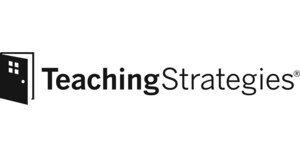In a new survey of over 2,300 early childhood educators, conducted by Teaching Strategies, educators who have access to high-quality professional development are less likely to say they plan to leave the field.
BETHESDA, Md., Oct. 6, 2022 /PRNewswire/ -- In a new survey released today by Teaching Strategies, the leading provider of early learning curriculum, assessment, professional development, and family engagement tools, early childhood educators who have access to high-quality professional development opportunities are more likely to be satisfied in their jobs and less likely to leave the profession.
The new survey echoes the impact of the pandemic on educator wellbeing and concerns over retaining educators in the field: almost half of early childhood educators surveyed reported struggling with mental health and burnout. Over 40 percent of respondents said staffing shortages affect these stress levels. Against that background, Teaching Strategies asked educators about their professional learning experiences and preferences, to better understand the role professional development can play in supporting educator wellbeing.
"The findings confirm what we have suspected: If we are to retain passionate educators, we must not only fairly compensate them for their critical work but we must make high-quality, flexible opportunities for professional growth more accessible," said Teaching Strategies CEO John Olsen. "As the field looks to retain amazing educators, we can't return to business as usual. For many educators, professional development has been too inconvenient, irrelevant or inaccessible. What we see in the data is an opportunity to intentionally create meaningful learning opportunities and career pathways that support educators and enable them to flourish. When we support educators where they are, we support children, families, and society at large."
The survey, which polled more than 2,300 early childhood educators across the nation, found:
- Compensation and mental health remain the driving reasons for early childhood educators considering a career change. Of the 20 percent of early childhood educators who said they are considering making a career change, 43 percent said compensation is the driving reason and 40 percent gave mental health as their reason.
- Professional development is important for teacher satisfaction. Seventy percent of early childhood educators who report access to professional development opportunities are statistically more likely to be satisfied with their jobs. Moreover, of educators planning to leave the profession, 65 percent are less likely to say they have access to professional development, compared to 77 percent of those planning to remain in the profession. Educators working in family childcare settings or Early Head Start are the least likely to report access to professional development.
- Early childhood educators prefer online, on-demand professional development. Nearly 60 percent of all educators surveyed said online would be one of their preferred methods of participating in professional development, and more than one-third of educators said this was the only way they want professional development. Just 18 percent said they only want live in-person professional development. This is true across all educators of all age groups.
View all survey findings here.
"Alongside critical factors like compensation and work environments, the survey tells us there's a valuable role for professional learning to play. By designing the learning experiences educators deserve and want -- on-demand, bite-sized, career-minded -- we create a path forward for educators to continue to grow in their practice. As a former educator myself, I find reasons for optimism in this survey," said Nicol Russell, Teaching Strategies Vice President of Implementation Research and NAEYC board member.
Earlier this summer, Teaching Strategies launched a first-of-its-kind membership program that gives early childhood educators access to live and on-demand e-learning courses, self-paced pathways to earn and maintain key industry credentials, one-on-one coaching, and a community of early childhood educators eager to share best practices with each other.
Driven by research that shows a child's first eight years form a critical foundation for success in school and in life, Teaching Strategies has been an advocate for the early education community for over 40 years. Today, Teaching Strategies connects teachers, children and families to inspired teaching and learning experiences, informative data, stronger family partnerships, and professional learning through the leading early learning platform and resources. Its products, including the most widely-used curriculum and assessment solutions The Creative Curriculum® and GOLD®, are found in over 250,000 classrooms and reach over 4 million children each year. To learn why thousands of early childhood programs and many states choose to partner with Teaching Strategies to help ensure children's success in school and in life, visit teachingstrategies.com and follow us on Twitter @TeachStrategies.
SOURCE Teaching Strategies

WANT YOUR COMPANY'S NEWS FEATURED ON PRNEWSWIRE.COM?
Newsrooms &
Influencers
Digital Media
Outlets
Journalists
Opted In





Share this article